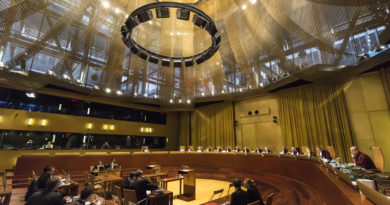EU ready for talks with UK, is everything covered?
“We are ready and well-prepared,” said Michel Barnier, the European Commission Chief Brexit negotiator, after receiving the mandate to start talks with the UK on the EU exit.
EU Ministers of European Affairs gave the mandate to the European Commission with directives on what the withdrawal agreement should include. The negotiations are expected to start on June 19, after the UK election. Unless a different decision will be made in the next 2 years, the Brexit date will be 30 March 2019 at 00:00 (Brussels time), at the latest. At that point, the UK will become a ‘third country’ and EU laws will cease to apply on its territory.
This will have important consequences for citizens, businesses and international partners. Not surprisingly, the directives state that the number one task will be providing clarity and legal certainty for those most affected. Only when progress is achieved in these areas, talks can start on a future trade agreement.
Safeguarding the status and rights of the EU27 citizens and their families in the United Kingdom and of the citizens of the United Kingdom and their families in the EU27 Member States is the first priority for the negotiations because of the number of people directly affected and of the seriousness of the consequences of the withdrawal for them.
According to the EU, rights of citizens arrived in the UK before the Brexit date should be maintained unaltered for their lifetime. In addition, the European Court of Justice (ECJ) should be the body guaranteeing that these provisions are applied. The British government hasn’t made specific proposals on this matter, but has said that the jurisdiction of the ECJ should end in the UK once the country leaves the EU.
The second priority for the EU is agreeing how much the UK owes to the EU budget upon departure. This will mean defining a way to calculate the level of commitments the UK already made with regard to EU programmes, to the European Investment Bank, the European Development Fund and the European Central Bank, as well as the withdrawal costs (e.g. the cost for relocating the EU agencies currently based in Britain) and pensions of British EU staff.
The EU also wants to ensure that the peace agreement in Northern Ireland will not be undermined. In this regard, “full account should be taken of the fact that Irish citizens residing in Northern Ireland will continue to enjoy rights as EU citizens,” continue the document approved on May 22.
British in Europe, the coalition of UK citizens’ groups resident in Europe, and the3million, a group representing EU27 citizens in the UK, overall welcomed the EU position. But they also expressed some reservations. “The most serious omission is that there is no proposal to ring-fence the agreement on citizens’ rights,” says a paper they drafted for EU institutions. This means that a deal on individual rights could fall if the more general Brexit agreement were not reached.
At a meeting with British in Italy on May 19, Sandro Gozi, Italian Undersecretary for European Affairs, said it would be extremely complex to have more than one exit agreement. But he was positive citizens’ rights will be honoured in the end.
Fears that there might not be a final accord, however, are real. Last week the UK Brexit Secretary, David Davis, threatened to walk away from the negotiations if the bill presented to the UK will be too high. “No deal is not my option and I’d welcome explanations of what a ‘no deal’ means and what its consequences are,” responded Barnier at a press conference on Monday.
Other concerns of citizens’ groups are about the possibility for Britons in Europe to continue enjoying freedom of movement across the EU27 after Brexit, and whether the EU Commission might be prepared to give up on some of the current rights.
Jeremy Morgan of ‘British in Italy’ commented: “We welcome the guidelines but there are real issues. In some areas they don’t go far enough. Also, the UK has not responded to EU negotiating position in detail yet. They promised a generous deal, but until we have seen a detailed response, we are not going to sleep any better.”
Claudia Delpero © all rights reserved.
Photo via Pixabay.






